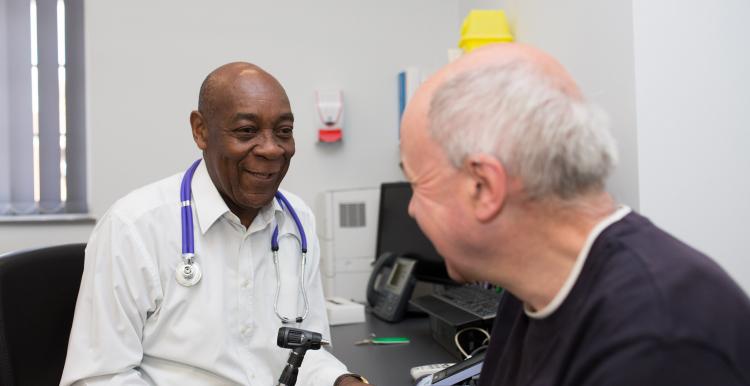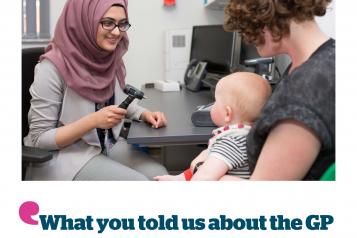Registering with your GP: understanding your rights

We have pulled together some answers to help you understand your rights when registering with your GP using NHS guidelines.
How do I register with a GP?
Anyone in England can register with a GP surgery. It's free to register.
Because of coronavirus (Covid-19), try to avoid going into a GP surgery to register.
You can:
- Check the GP surgery website to see if you can register online
- Call or email the GP surgery and ask to be registered as a patient
You can download a GMS1 registration form on GOV.UK if you're asked to complete one.
Do I need a proof of address to register?
Having proof of where you live helps, but NHS guidelines clarify you don’t need to have proof of address when registering with a GP. This also applies if you are an asylum seeker, refugee, a homeless patient or an overseas visitor - whether lawfully in the UK or not.
Do I need ID to register with my GP?
You do not have to provide ID when registering with a GP, but it does help. Below is a list of documents that you can use as ID:
- Passport
- Birth certificate
- Biometric residence permit
- Travel document
- HC2 certificate
- ARC card
- Utility bill
What could stop me from being able to register at my GP?
A GP must explain the reason for refusing your request to register in writing. The GP has the right to refuse if the following criteria are met:
- They are not taking any new patients
- You live outside the practice boundary and they are not accepting patients from out of their area
- You have been removed from that GP surgery register before
- It's a long way from your home and you need extra care, for example home visits
What to do if you are refused the right to register
Ask the GP receptionist to write with the reason why they cannot register you. If the GP already has too many patients, they can refuse to register you, but they must explain this in writing.
If you have problems registering with a GP surgery:
- Call the NHS England Customer Contact Centre on 0300 311 22 33
- Contact us for help and advice
- Contact local organisations - for example if you're homeless you could ask a centre that supports homeless people for support
Here are some ways that you can make a complaint:
By email (for the attention of the complaints manager in subject line)
By post: NHS England, P.O. Box 16738, Redditch, B97 9PT
By phone: 0300 311 2233 (Telephone Interpreter Service available)
Further information can be found from Citizens Advice Wiltshire or contact Healthwatch Wiltshire.
This information can be made available in alternative formats, such as easy read or large print and may be available in alternative languages upon request. To receive this, contact 0300 311 2233 or send an email to NHS England.
I want to change my GP practice, do I have to give a reason?
No, you don't have to tell your practice why you want to change or your new one why you made that decision.
You will need to fill in a registration form. A request will then be made to your current GP for your medical records to be transferred to the new GP surgery.
You should tell the GP surgery if you change address or move out of the area.
Getting ill during the holidays
If you have registered at a new practice whilst at university and become unwell when you're at home or not staying near your university GP, you can contact your nearest practice for treatment.
You can receive emergency treatment for 14 days. After that you will have to register as a temporary resident or permanent patient.
Find out how to register as a temporary resident with a GP
You can also visit an NHS urgent treatment centre, which can provide treatment for minor injuries or illnesses such as cuts, bruises and rashes.
However, they are not designed for treating long-term conditions or life-threatening problems. You do not need an appointment and you do not need to be registered.
What if someone is unable to register?
If a person is unable to register with a GP because they cannot make decisions about their care, registration can be done by:
- A relative
- The main carer
- A lasting power of attorney
- A person appointed by a court under the Mental Capacity Act. The Act is designed to protect and empower people over 16 who are unable to make decisions about their care and treatment.
More information
Are you an asylum seeker, refugee, a homeless patient or an overseas visitor, whether lawfully in the UK or not?
Download these leaflets and be more aware of your rights to register with your GP.
- Leaflet for asylum seekers and refugees
- Leaflet for Gypsy, Travellers, and Roma communities
- Leaflet for homeless people
- Information for overseas visitors about using the NHS
My Right to Healthcare card
Groundswell has been funded by NHS England to produce a My Right to Healthcare card to help people register.
They are available nationally and can be ordered for free.
You can also download a GP access card from the Doctors of the World website.


